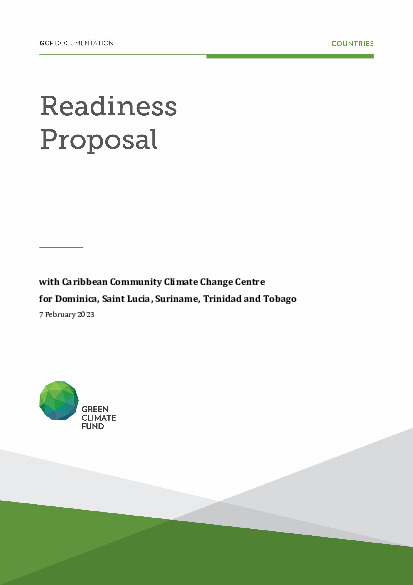Multi-Country Climate Resilient Urban Development Initiative
This Readiness Grant request seeks to advance efforts to build climate resilience of national and sub-national governments and the urban spaces they govern across four (4) CARICOM States – Dominica, St Lucia, Trinidad and Tobago and Suriname. The proposed activities will employ an integrated, strategic and gender inclusive approach to enhance capacities in the targeted countries to respond to impact of climate through the advancement of low carbon development and urban resilient planning.
The vulnerabilities of these territories to the impact of climate change are being exacerbated by rapid urbanization, urban sprawl, urban informality, inefficient infrastructure and poor access to basic services. Urban development plans and policies are outdated and have limited alignment with climate adaptation and mitigation approaches. While conversations around urban resilience have increased, there is still a need to mainstream climate action in urban governance, planning and development in the countries targeted under this readiness request. As such, this multi-country initiative will take a structured and coordinated approach to address the following barriers:
- limited knowledge and awareness of the specific climate change impacts and challenges in the urban communities
- paucity of readily accessible data disaggregated at the city and urban scales including geospatial data
- limited consideration for climate adaptation and mitigation and disaster risk reduction in development planning in urban spaces
- limited capacities at the national and local government levels to incorporate climate action into the urban development process
- limited access to low carbon tools and technologies to support low carbon development pathways in urban communities
- Inadequate financing directed towards climate change mitigation and adaptation in urban sector projects.
These barriers are derailing countries' efforts to achieve urban climate resilience. This readiness will provide national and local governments, the private sector NGO and academia with the capacity and tools needed to improve planning and governance from a regional, national, and local perspective. Additionally, these countries will realize co-benefits related to adopting low carbon development pathways in their urban spaces. Project activities will support gap and technology needs assessments and the development of policies and tools aimed at capacitation of decision and policymakers, planning professionals, technical organizations and civil society. Also, effort will be made to increase awareness and knowledge of the climate change vulnerabilities and risks in the urban sector. This grant request will also create an opportunity to deepen collaboration with key non- traditional partners and stakeholders in the urban sector including private sector representative, universities and research institutions, and professional organizations (e.g., Commonwealth Local Government Forum (CLGF), who all play a vital role in supporting urban resiliency). The proposed activities and outputs are aligned with the following outcomes of the Green Climate Fund Readiness Programme:
- Outcome 1.3 supports relevant country stakeholders in establishing adequate capacity, systems and networks to support the planning, programming and implementation of GCF-funded activities.
- Outcome 2.2 supports a Regional Gap Analysis and Regional Strategy accompanied by country specific Implementation Plans for climate resilient development in the urban spaces.
- Outcome 4.1 seeks to increase investments in urban resilience through the development of concept notes and pre-feasibility studies developed and submitted.
This readiness therefore seeks to directly strengthen the capacity of policymakers, local government representatives, and community-based organizations to implement actions for resilience building in urban spaces across Trinidad and Tobago, Dominica, Suriname, and St Lucia. Also, the outputs this Readiness request will support the transfer of knowledge and increased education and awareness for representative of technical organizations and researchers, civil society, private sector and the wider community in Caribbean SIDs on urban sector climate change vulnerabilities, risks and possible response options.
